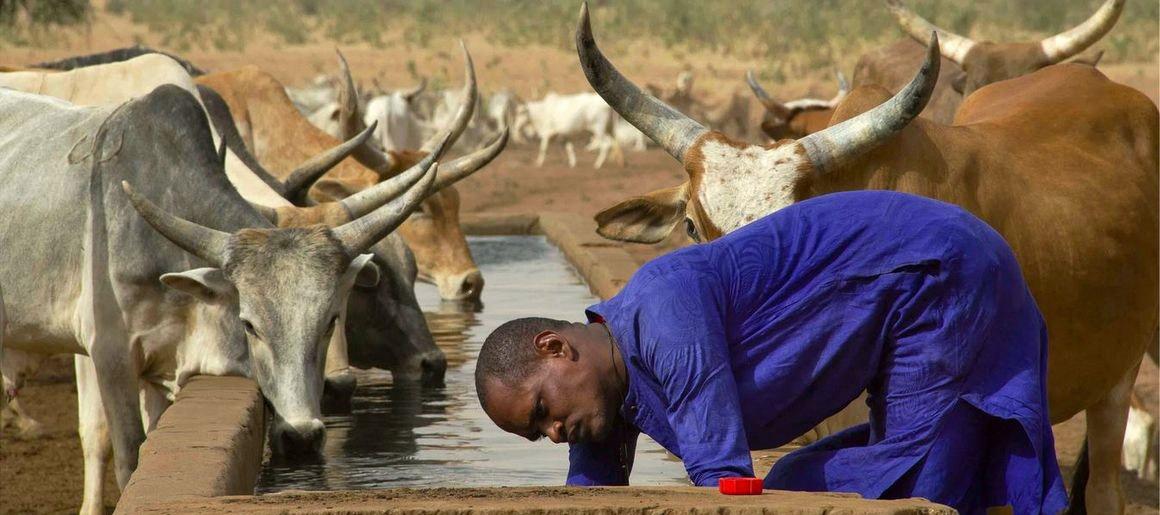- Home
- Worldwide
- CIRAD worldwide
- Projects
- AFRICAM Project
Preventing zoonotic disease emergence in Africa and Cambodia - AFRICAM

Human, animal and environmental health are all interconnected © R. Belmin, CIRAD
Issues
The AfriCam project is the first part of the PREACTS programme (PREZODE in action in the global South), jointly led by CIRAD and IRD. It constitutes the first operational phase of the PREZODE initiative for countries of the global South, which are the most affected by zoonotic disease outbreaks. The goal of the PREZODE initiative, launched in 2021, is to prevent the emergence of zoonoses through the construction of resilient, sustainable and economically viable socio-ecosystems. PREZODE builds on the One Health approach, which encompasses human health, animal health and environmental health.
The AfriCam project was designed to meet the national needs of the five target countries, including:
- Building knowledge on the risks of zoonotic disease outbreaks at the human-animal-ecosystem interface, according to sociocultural contexts, the environment and local uses and socio-economic constraints;
- Identifying, monitoring and reducing these risks by working with frontline operators to develop surveillance strategies at the local level, with a view to informing public policies at a more global level;
- Understanding gender inequalities in zoonotic disease emergence in order to better integrate them into risk prevention and reduction strategies;
- Enhancing risk management capacities at the territorial level, by supporting local actors and existing initiatives;
- Strengthening the capacities and the inclusion of local organisations, building on participatory science and the implementation of a permanent science-society-policy dialogue;
- Consolidating partnerships and promoting collaborations between initiatives and sectors, building on existing tools and/or those developed in the context of other projects.
In order to ensure the prevention solutions are firmly rooted in the local contexts, the project methodology will be participatory. The activities will thus be led by a broad consortium of partners involving public and private research operators, universities, civil society organisations and the competent authorities from each of the five countries.
Description
The content of the project is based on a co-construction process in three phases.
First, it is part of the PREZODE initiative approach, which has mobilised actors from all sectors in order to lay the foundations for the desired theory of change through the organisation of regional workshops in 2021 and the definition of a shared strategic agenda.
Second, a context analysis was conducted in each of the five countries to identify relevant focal areas, serving as a basis for discussions with the competent authorities, research institutes and civil society actors.
Finally, a consultation process has been implemented with each of the national partners in order to define the most relevant issues and activities, based on the priorities identified by the local partners, resulting in the finalisation of frameworks for action specific to each country. These detailed frameworks will be further developed and adjusted during the first six months of the project.
Thus, depending on national requirements, the national implementation of the project will revolve around the following four components:
- Assessment of the risks of zoonotic disease emergence;
- Risk reduction through the definition of prevention strategies;
- Implementation of surveillance and early detection strategies;
- Cross-cutting scientific activities.
The AfriCam project is jointly managed by CIRAD and IRD. CIRAD coordinates activities in Madagascar and Senegal, while IRD coordinates the project in Cambodia, Guinea and Cameroon. CIRAD is responsible for the overall coordination.
Expected results
- The risks will be identified and reduced: in the project’s pilot sites, an assessment of practices will be conducted with local communities and livestock farmers, in order to determine the risk factors together. What are the interactions between humans and their environment? What are the associated health impacts? How can these be reduced?
- Prevention strategies will be adapted to local contexts: based on the risks identified, the local actors will define strategies adapted to their needs, their constraints and their environment, with a view to building resilient socio-ecosystems;
- Community warning systems will be strengthened: the engagement of local populations and field actors is crucial. Participatory surveillance, which is complementary to conventional epidemiological surveillance, is therefore essential;
- Permanent science-society-policy dialogue platforms will be established: to act rapidly, it is essential to share information between the different scales, to ensure the engagement of actors at all levels and to inform public policy decisions, including in terms of gender inequalities in the face of outbreaks.
























